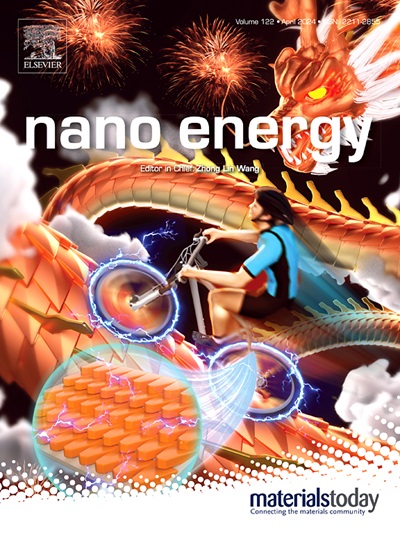A Passive Power Management Unit Based on Charge Shunting and Current Enhancing for Significantly Improving the Efficiency of Triboelectric Energy Harvesting
IF 16.8
1区 材料科学
Q1 CHEMISTRY, PHYSICAL
引用次数: 0
Abstract
The power management unit (PMU) plays a crucial role in enhancing the energy storage efficiency of triboelectric nanogenerators (TENGs). However, the majority of traditional PMUs cannot meet the high requirements of modern Internet of Things (IoT) for power management systems due to the limitation in achieving fully self-powered functions or relatively high energy storage efficiency. In this work, we propose a fully self-powered PMU that combines charge-shunting and current-enhancing strategies to significantly improve energy storage efficiency. The charge-shunting circuit effectively mitigates energy losses caused by mutual charge cancellation, while the current-enhancing circuit significantly boosts the output current compared to conventional designs. Moreover, the proposed PMU achieves the energy storage efficiency of 53.6%, representing a significant improvement over conventional passive electronic switch PMUs.With this PMU, it can be achieved 1 minute wireless transmission of self-powered attitude sensor data. This work presents a self-powered PMU for TENGs, offering a practical solution for widely used IoT sensor networks.

一种基于电荷分流和电流增强的无源功率管理单元,可显著提高摩擦电能收集效率
功率管理单元(PMU)对于提高摩擦纳米发电机(TENGs)的储能效率起着至关重要的作用。然而,大多数传统pmu由于无法实现完全自供电功能或相对较高的储能效率而无法满足现代物联网(IoT)对电源管理系统的高要求。在这项工作中,我们提出了一种完全自供电的PMU,它结合了电荷分流和电流增强策略,以显着提高储能效率。电荷分流电路有效地减轻了电荷相互抵消造成的能量损失,而电流增强电路与传统设计相比显着提高了输出电流。此外,所提出的PMU的储能效率达到53.6%,比传统的无源电子开关PMU有了显著的提高。有了这个PMU,它可以实现1分钟无线传输自供电姿态传感器数据。这项工作提出了一种用于teng的自供电PMU,为广泛使用的物联网传感器网络提供了实用的解决方案。
本文章由计算机程序翻译,如有差异,请以英文原文为准。
求助全文
约1分钟内获得全文
求助全文
来源期刊

Nano Energy
CHEMISTRY, PHYSICAL-NANOSCIENCE & NANOTECHNOLOGY
CiteScore
30.30
自引率
7.40%
发文量
1207
审稿时长
23 days
期刊介绍:
Nano Energy is a multidisciplinary, rapid-publication forum of original peer-reviewed contributions on the science and engineering of nanomaterials and nanodevices used in all forms of energy harvesting, conversion, storage, utilization and policy. Through its mixture of articles, reviews, communications, research news, and information on key developments, Nano Energy provides a comprehensive coverage of this exciting and dynamic field which joins nanoscience and nanotechnology with energy science. The journal is relevant to all those who are interested in nanomaterials solutions to the energy problem.
Nano Energy publishes original experimental and theoretical research on all aspects of energy-related research which utilizes nanomaterials and nanotechnology. Manuscripts of four types are considered: review articles which inform readers of the latest research and advances in energy science; rapid communications which feature exciting research breakthroughs in the field; full-length articles which report comprehensive research developments; and news and opinions which comment on topical issues or express views on the developments in related fields.
 求助内容:
求助内容: 应助结果提醒方式:
应助结果提醒方式:


